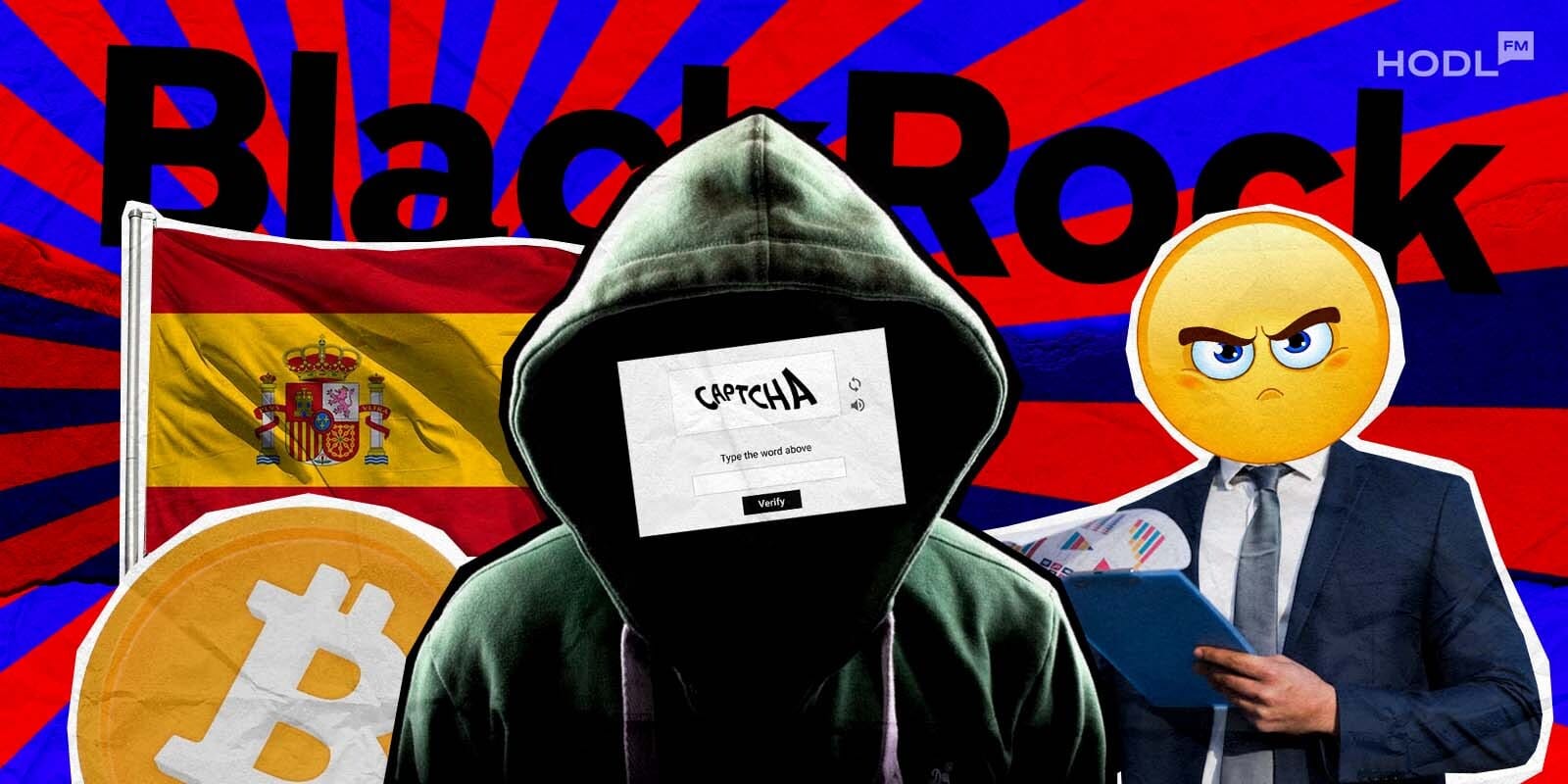Economist Admits Mistake, Malware via Fake Captchas, $10.5M Tax Penalty, and BlackRock’s Bitcoin Hold

Tough week? We keep going anyway. That’s what crypto teaches us: there’s always another opportunity around the corner. Weekends are for rest, not trades. But before you log off, let’s catch up on the news that shaped this crazy week.
Top Gainers and Losers
- OKB (OKB) showed an incredible surge in price. It jumped by 156.24%, reaching $243.23.
- Morpho (MORPHO) token climbed 15.91% and is now trading at $2.39.
- Mantle (MNT), taking the bronze medal for the second week in a row, rose at 14.56% and brought its price to $1.24.
- Pump.fun (PUMP) dropped nearly 24.92%,and reached $0.002803.
- SPX6900 (SPX) dipped by 19.85%, continuing its slide to $1.28.
- Fartcoin (FARTCOIN) lost 15.24% of its value this week and now trades at $0.8788.
Meme of the Week
Harvard economist Admits His Mistake on $100 Bitcoin
“Almost a decade ago, I was the Harvard economist who said Bitcoin was more likely to be worth $100 than 100K. What did I miss?”.
This is how Kenneth Rogoff, Harvard economist and former chief economist of the International Monetary Fund (IMF), begins his post on X.
Rarely do academics admit they were wrong. Kenneth did so, while at the same time making a few derogatory remarks about Bitcoin, and turned off replies on X. However, facts and other well-known economists oppose his every point.
“I was far too optimistic about the US coming to its senses about sensible cryptocurrency regulation”.
However, what makes more sense is up to the government to decide. After the Trump administration won the November election, Bitcoin broke $100,000 in December 2024 and has surged more than 80% to a new all-time high.
“Second, I did not appreciate how Bitcoin would compete with fiat currencies to serve as the transaction medium of choice in the twenty-trillion-dollar global underground economy,” he continued on X.
Actually, bitcoin became an inflation hedge for economies with crazy devaluation of local currency. Regarding illicit activity tied to cryptocurrencies, its share is much smaller than one might imagine – less than 1% of what is laundered using cash.
In the third point, he stated that he didn’t anticipate that regulators would be able to hold hundreds of millions of dollars in cryptocurrencies without consequence, given the conflict of interest.
To this, Bitwise’s chief investment officer, Matt Hougan, responded that Rogoff
“Failed to imagine that a decentralized project, which drew power from people and not centralized institutions, could succeed at scale.”
Ironically, his alma mater, Harvard, reported a $116 million investment in BlackRock’s spot Bitcoin ETF earlier this month.
Hackers Spread Lumma Stealer Malware Through Fake Captchas
Lumma Stealer is a Malware-as-a-Service (MaaS), sold on dark web forums for as little as $250 per month. Cybercriminals are distributing it using fake Captcha prompts. They hunt for browser credentials, cookies, password manager vaults, 2FA tokens, and crypto wallets.
According to DNSFilter, the malware was first detected on a Greek banking site. The prompt requests that Windows users copy and paste it into the Run dialog box and then press Enter. Around 17% of users complied and received fileless malware.
Nathaniel Jones, VP of Security & AI Strategy at Darktrace, said that in 2023, the malware infected an estimated 400,000 Windows devices and caused $36.5 million in losses.
This May, the U.S. Department of Justice seized five internet domains of Lumma Stealer malware, while Microsoft privately took down 2,300 similar domains. However, it resurged.
The appeal lies in its cheap subscription model in comparison with potential gains. After the data is stolen, they are often fed directly into “traffer teams,” which specialize in the theft and resale of credentials.
“This creates a devastating cascade effect where a single infection can lead to bank account hijacking, cryptocurrency theft, and identity fraud that persists long after the initial breach,” added Jones.
Darktrace suggested a Russian origin of Lumma-related exploits.
DeFi Investor Hit With $10.5M Loan Tax Penalty in Spain
A DeFi investor was hit with a $10.5 million tax bill after the Spanish tax agency classified a crypto-backed loan as taxable gains.
Spanish news outlet Periodista Digital released a report analyzing this situation. The investor had already declared all cryptocurrency operations and paid $5.84 million in taxes.
Three years later, authorities issued an additional bill tied not to undeclared profits, but to the act of depositing assets into a DeFi protocol in exchange for a loan. However, the assets were not sold, and no profit was realized, the report said.
The report said the Spanish Agencia Estatal de Administración Tributaria (AEAT) classified a stablecoin loan as a capital gain and token transfers to protocols Beefy or Tarot as taxable events.
A tax adviser quoted in the report said that the local tax agency “has taxed something that, from any economic or legal perspective, is not income.” The adviser added that the movement of assets in the DeFi protocol was treated as realized gains and was “an interpretation with no legal basis in Spanish or European legislation.”
Additionally, Spain’s tax agency has been warning crypto holders about taxes for years, sending 328,000 warning notices for taxes on crypto in 2023, followed by 620,000 similar notices a year later.
BlackRock Now Holds Over 3.5% of Bitcoin Supply
As on 22 August 2025, BlackRock holds 747.424K BTC – around 3.56% of all circulating coins. Its ETF, called iShares Bitcoin Trust (IBIT), holds a key position in the spot Bitcoin ETF market, as it controls nearly 60% of all Bitcoins held in spot ETFs in the US.
At the same time, American spot Bitcoin ETFs have accumulated over 1.25 million BTC, which is equivalent to more than 6% of the total supply of this cryptocurrency.
On August 19, 2025, investors withdrew $523.31 million from the spot Bitcoin ETF in a single day. This indicates dynamic changes in the structure of cryptocurrency asset ownership among the major market players.
Spot ETFs have opened the door for banks, pension funds, and asset managers to invest in Bitcoin. Instead of buying and holding Bitcoin directly, large investors prefer ETFs because they offer regulated custody, clear rules, standardized reporting, and remove the hassle of managing wallets or private keys.
However, this rapid accumulation also raises concerns. After the 2024 halving, the new coin supply is lower, so ETF demand adds to scarcity. Now, market swings could increasingly depend on ETF inflows and outflows.

Disclaimer: All materials on this site are for informational purposes only. None of the material should be interpreted as investment advice. Please note that despite the nature of much of the material created and hosted on this website, HODL FM is not a financial reference resource, and the opinions of authors and other contributors are their own and should not be taken as financial advice. If you require advice. HODL FM strongly recommends contacting a qualified industry professional.



